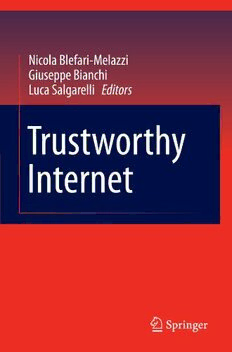
Trustworthy Internet PDF
388 Pages·2011·4.201 MB·English
Most books are stored in the elastic cloud where traffic is expensive. For this reason, we have a limit on daily download.
Preview Trustworthy Internet
Description:
The term “trustworthy” has a very precise connotation in the European Community’s FP7 research program. For a network to be qualified as trustworthy, it needs to be secure, reliable and resilient to attacks and operational failures. Furthermore, quality of service must be guaranteed, while protecting user data, ensuring privacy and providing usable and trusted tools to support users in their security management. As such, the Trustworthy Internet not only has to include mechanisms, architectures and networking infrastructures that intrinsically provide basic security guarantees, but it also has to ensure users, service providers and application providers alike that their requirements in terms of Quality of Experience, manageability and efficiency are fully met. Providing such combined guarantees in a rapidly evolving, complex infrastructure such as the Internet requires solving challenging issues that encompass many fields of theoretical and applied information engineering. These issues span all levels of the protocol stack, ranging from finding new intrinsically secure transmission systems, to radically novel routing models, to new architectures for data dissemination and for interconnecting an unprecedented number of devices and appliances. This book aims at representing a view of the state of the “Trustworthy Internet” as we enter the second decade of our century. The material included in this book originated from the 21st International Tyrrhenian Workshop on Digital Communications, an event traditionally organized by CNIT, the Italian inter-university consortium for telecommunication research. The workshop comprised either invited contributions from renowned researchers with complementary expertise, as well as independent, peer-reviewed contributions stimulated through an open call for papers. This volume includes a selected subset of the workshop papers. Each contribution has been edited and extended after the workshop, taking into account the discussions carried out during the event, incorporating when appropriate additional technical material. Furthermore, the authors have strived to complement the specific technical aspects they present with background material devised to more comprehensively introduce the reader to the specific topic of trustworthiness tackled.
See more
The list of books you might like
Most books are stored in the elastic cloud where traffic is expensive. For this reason, we have a limit on daily download.
